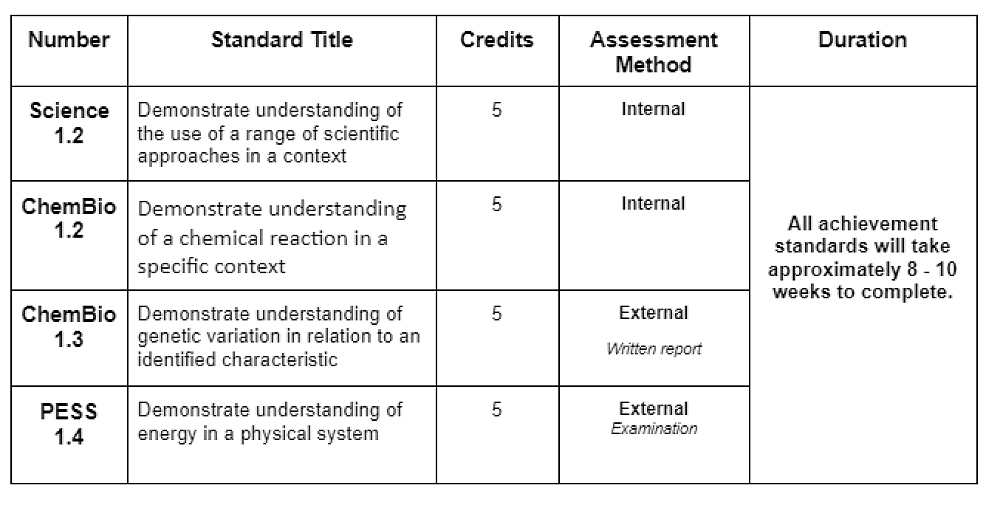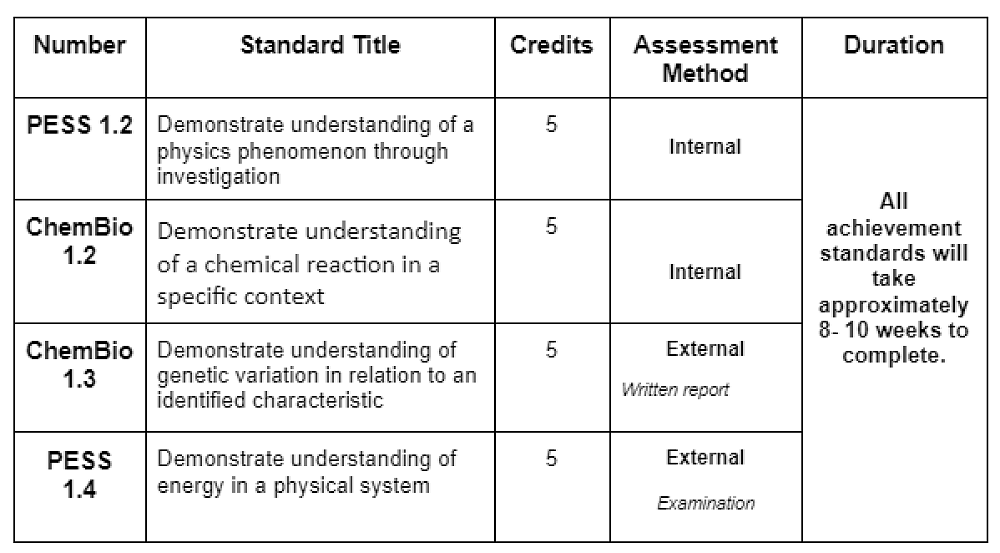Science: Level 1
Qualification - NCEA level 1
Course Overview: there are two Science courses offered at Level 1, General Science and Physical Chemistry. Year 11 students must select ONE of the courses.
General Science: Level 1
Science involves generating and testing ideas and gathering evidence to understand, explain, and develop knowledge about the natural world. Scientists do this by making observations, carrying out investigations and modelling, and by communicating and debating with others.
Through the nature of science, students learn what science is and how scientists work. They develop the skills, attitudes, and values to build a foundation for understanding the world. They come to appreciate that while scientific knowledge is durable, it is also constantly re-evaluated in the light of new evidence. They learn how scientists carry out investigations, and they come to see science as a socially valuable knowledge system. They learn how science ideas are communicated and to make links between scientific knowledge and everyday decisions and actions. These outcomes are pursued through the following major contexts in which scientific knowledge has developed and continues to develop.
Big Ideas
Science knowledge is contested and refined over time
Science uses different inquiry approaches to develop understanding
Science uses subject-specific literacy to communicate knowledge
Science based information can be used in decision making and action
Topics Covered
Investigative approaches (pattern seeking, exploring and observing, modelling, classifying and identifying, fair testing)
Collation and presentation of evidence
Chemical reactions (neutralisation, Combustion, precipitation)
Conservation of mass
Patterns in types of chemical reactions
Interpreting chemical equations
Trends in the periodic table.
DNA, genes and alleles, genotypes, phenotypes, inheritance
Gene tracking methodology (phylogenetic or family trees, genome data, punnet squares)
Uses and applications of genetics
Mechanical energy (gravitational potential, kinetic, work done)
Thermal Energy (heat capacity and latent heat) and
Electrical energy (energy, power and resistance)

Physical Chemistry: Level 1
Course Overview
Science involves generating and testing ideas and gathering evidence to understand, explain, and develop knowledge about the natural world. Scientists do this by making observations, carrying out investigations and modelling, and by communicating and debating with others.
Through the nature of science, students learn what science is and how scientists work. They develop the skills, attitudes, and values to build a foundation for understanding the world. They come to appreciate that while scientific knowledge is durable, it is also constantly re-evaluated in the light of new evidence. They learn how scientists carry out investigations, and they come to see science as a socially valuable knowledge system. They learn how science ideas are communicated and to make links between scientific knowledge and everyday decisions and actions. These outcomes are pursued through the following major contexts in which scientific knowledge has developed and continues to develop.
Big Ideas
Inquiry approaches can be applied to explain concepts of the physical world
Physical phenomena can be explained through physics principles and communicated using physics conventions
Properties of matter are determined by interactions of particles
Chemistry and Biology use a variety of inquiry approaches to gain understandings
Topics Covered
understanding of a physical phenomenon through investigation, within a mechanics context, for instance motion of falling objects, mechanical waves or buoyancy.
Theory of mechanics such as motion – constant speed & constant acceleration, forces, Newton's laws of motion, and pressure
Chemical reactions (neutralisation, combustion, decomposition, combination, and precipitation)
Conservation of mass within chemical reactions
Patterns in types of chemical reactions
Interpreting chemical equations
Trends in the periodic table
DNA, genes and alleles, genotypes, phenotypes, inheritance
Mitosis, Meiosis, mutations
Gene tracking methodology (phylogenetic or family trees, genome data, punnet squares)
Mechanical energy (gravitational potential, kinetic, work done)
Thermal Energy (heat capacity and latent heat) and
Electrical energy (energy, power and resistance)

